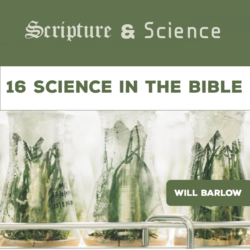In our last episode, Dr. Jerry Wierwille led us through a contextual overview of Hebrews 1 and 2 in order to situate Hebrews 1.10-12. Today, we’ll consider seven interpretations of Hebrews 1.10-12, including:
- Father as referent, doxology
- Jesus as creator of Genesis creation
- Jesus as creator of figurative heaven and earth (referring to people and political institutions)
- Jesus as creator of figurative heaven and earth (referring to Mosaic order)
- Jesus as creator of heaven and earth for millennial kingdom
- Jesus as creator of new creation
- Jesus as the embodiment of God’s wisdom
This survey should help shed light on the strengths and weaknesses of these views. We won’t get into the seventh position much in this episode, but we will cover it in detail in the next one.
Listen to this episode on Spotify or Apple Podcasts
—— Links ——
- Check out these other episodes in this series on Hebrews 1
- See more episodes with Jerry Wierwille
- More resources on Hebrews 1.10
- Support Restitutio by donating here
- Designate Restitutio as your charity of choice for Amazon purchases
- Join our Restitutio Facebook Group and follow Sean Finnegan on Twitter @RestitutioSF
- Leave a voice message via SpeakPipe with questions or comments and we may play them out on the air
- Intro music: Good Vibes by MBB Attribution-ShareAlike 3.0 Unported (CC BY-SA 3.0) Free Download / Stream: Music promoted by Audio Library.
- Who is Sean Finnegan? Read his bio here








A great academic discussion, Sean and Jerry – but what about the great practicalities of Hebrews chapter two, et al. IF –
” .. we do not have a high priest who is unable to empathise with our weaknesses, but we have one who has been tempted in every way, just as we are – yet he did not sin.” (Heb. 4:15),
and;
” Because he himself suffered when he was tempted, he is also able to help those who are being tempted. ” (Heb. 2:18),
and;
” In your struggle against sin, you have not yet resisted to the point of shedding your blood ” (Heb. 12:4),
then how would it help, uplift, and motivate the recipients of the Epistle to the Hebrews to, allegedly, (on the basis of the understanding of ‘paraplesios’ in Heb. 2:14, in the Revised English Version, Bible) learn that Jesus had a human nature that was SIMILAR to ours, but in reality was superior (prelapsarian), and more intrinsically sin-resistant than our own (postlapsarian) human nature ?
” Now since the children participate fully in blood and flesh, in A SIMILAR WAY (Gk. paraplesios) he also himself shared the same ..” (Heb. 2:14, REV Bible);
OR,
” Since all the children share the same human nature, he too shared EQUALLY (Gk. paraplesios) in it .. ” (‘The New Jerusalem Bible’), AND,
” Because the children share flesh and blood in common, Jesus shared in this in THE SAME WAY (Gk. paraplesios) …” (Sir Anthony Buzzard’s New Testament).
Hi John,
Thanks for your effort in posting this question. However, I don’t find it directly relevant to the episode. Nevertheless, I think you might have missed the actual REV translation of Heb 2:14: “Now since the children participate fully in blood and flesh, in a similar way he also himself shared the same….” It appears you focus on the translation of παραπλησίως (“in a similar way”) but did not seem to take note of the full phrase which ends with how Jesus himself “shared the same.” I would argue that there is not an intrinsic issue with how the REV is translated that would necessarily indicate a prelapsarian or postlapsarian comparison is intended.
Regarding your question about the practicalities of Heb 2:14, my question to you is, how do you see the difference in Jesus having a “similar nature” versus “same nature” since everyone is currently in a postlapsarian state, whether you believe Scripture teaches inherited sin or not. Everyone has sinned (been corrupted by sin), yet Jesus never was. So regardless of your interpretation of Heb 2:14, the fact remains that we are affected by sin in a way that Jesus was not. So the difference remains. Therefore, I am not clear on exactly the issue you are posing about the difference between Jesus and us. If you could refine your question in light of the fact that we all have sin and Jesus doesn’t, I might be able to provide a answer.
Blessings,
Jerry
God bless you, Dr. Jerry Wierwille,
Many thanks to yourself, and to Sean, for the last three interesting episodes – and for your latest comments.
I make the following points to elucidate my question :
(1). A common Christian view is that Adam’s transgression directly led to a fundamental change in human nature, and rendered it more prone to commit sin. This subsequent human condition is often referred to as ‘fallen human nature’ – and the traditional Church view is that Jesus did not share in our fallen human nature. The traditional view is also essentially adopted by the REV Bible commentary in its notes on Hebrews 2:14.
(2). However, in more recent years, quite a number of prominent scholars have concluded that the New Testament does in fact (contrary to Church tradition) teach that Jesus fully shared in our fallen human nature (but without committing any actual sin). These include C.E.B. Cranfield, James Dunn, C.K. Barrett, Lesslie Newbigin, Wolfhart Pannenberg, William Barclay, Nels Ferre, Anders Nygren, et al.
(3). My question is :
Whoever the original recipients of the ‘Epistle to the Hebrews’ were (Alexandrian Christian Jews, or whoever), how do you think that Hebrews 2:14 would comfort and encourage them to know (If the REV commentary, and Church tradition, is correct) that Jesus did not share in their (fallen) human nature, but instead had a superior, more sin-resistant, pre-Fallen human nature ?
This is an issue I’m still thinking through, Jerry.
With cordial regards,
John.
Hi John,
Thanks for elucidating your points. I am, in fact, very informed on original sin as well as the concept of the age of accountability. Kegan Chandler and I did a multi-part podcast on the subject where I defended the biblical idea of “sin” as a corrupting influence (i.e., power) that is inherited and affects all humankind. I take an approach to human depravity where Sin (the power) affects us in a way that makes us more inclined to commit sin (the act), but not to the point of being unable to choose not to sin, esp with the power of the spirit.
I myself, as well as the REV commentary, endorse the view of original sin in the Bible. I think the Apostle Paul expresses that reality in a very clear manner in Rom 7 and elsewhere with his concept of the “flesh.”
But to your question about the pragmatic dimension of Heb 2:14 when it comes to Jesus sharing the same flesh and blood as we do, I see the point of the verse as declaring the truth of Jesus’ solidarity with humankind, and that as a true human being, he was able to free humankind from the power of death. Verse 17 explains that he had to be like us “in every respect,” but that does not include having sin in him. There is a difference between Jesus and us, and that is why he “shared the same (flesh and blood)” in a similar way to us but not in an identical and comprehensive way that included inherited sin.
Jesus had all the same struggles that we do in our flesh (Heb 4:15). Yet that is not true universally in every possible circumstance. For example, I don’t think it includes the temptations that accompany the pain and struggles caused by committing sin. Thus, I don’t think Jesus ever struggled with the temptations that emerge after you steal from someone or betray someone or lie to someone or kill someone.
What I think Heb 4:15 is saying is that Jesus fully experienced the same flesh and blood that governs the fallen human condition along with all the temptations that flesh and blood bring but without ever succumbing to sin.
This is because God sent Jesus in the “likeness of sinful flesh” (Rom 8:3). Whatever “likeness” Paul is identifying that Jesus shared with fallen humankind, we know that it included the sinful temptations of the flesh (Heb 4:15), but he did not inherit the power of sin in the same way we do from our parents.
I hope this helps explain the value of Heb 2:14 and my view of Jesus and original sin.
Blessings,
Jerry
Hi, Jerry.
Many thanks for your comments.
I think your last two paragraphs really ‘hit the nail on the head” – except perhaps, for one point. You say :
“..he [Jesus] did not inherit the power of sin in the same way we do from our parents”.
But is not possible that a fundamental rebuttal of this view is contained in Romans 8:3 ? Leading Pauline scholar, James D. G. Dunn, wrote in reference to this verse :
“..He [God] sent His Son ‘in the very likeness of sinful flesh’, that is, to deal with the problem [of Sin] from within. The implication is not that Christ was himself a sinner but that he shared the flesh of humankind, the flesh whose weakness [cf. Rom. 5:6] gave sin its opportunity (Rom. 7:5). This is Paul’s equivalent to Hebrews 4:15. Jesus experienced the frailty of humankind to the full; he knew in personal experience that enticement to personal advantage, for desire to become lust. The real humanity of Jesus was never in question for Paul.” (‘Romans : The People’s Bible Commentary’, p.93)
And, again by James D.G. Dunn :
” Here [‘in the very likeness of sinful flesh’] however, the fundamental thought is added that God achieved his purpose for man not by scrapping the first effort and starting again, but by working through man in his fallenness, letting sin and death exhaust themselves in this man’s [Jesus’] flesh, and remaking him beyond death as a progenitor and enabler of a life ‘kata pneuma’ [‘according to the Spirit’]. Hence whatever the precise force of the ‘homoioma’ [likeness], it must include the thought of Jesus’ complete identification with ‘sinful flesh’ (cf. New Jerusalem Bible [8:3]: ‘the same human nature as any sinner); ” (Romans 1-8; World Biblical Commentary, p. 421.)
Finally, Kenneth Grayston on Romans 8:3 : ‘sending His Son in the likeness of our sinful nature’, :
“The word ‘likeness’ [Gk. homoioma’] can imply similarity or identity : here [in Rom. 8:3] it indicates identity.” (‘The Epistle to the Romans’; Epworth Commentaries, p.64).
Hi, Jerry;
I’ve had a recent discussion word with the highly experienced New Testament Greek scholar, Dr. John Bechtle (https://ezraproject.com/john-bechtle) for his take on Hebrews 2:14 – a verse which is cited on page seven of your UCA Paper. He personally thinks that the dispute over whether the human nature of Jesus was Fallen, or Unfallen, cannot be settled on the basis of the Greek word ‘paraplesios’. However, he does mention that :
” A noted use of the word [paraplesios] in Classical Greek is when a philosopher attempts to restrain the ego of Alexander the Great by pointing out that he is ‘paraplesios like other men’. The phrase leaves room for many individual distinctives between Alexander and others, while affirming the same underlying human nature.”
In similar fashion, the highly rated ‘Translator’s New Testament’ renders Hebrews 2:14a as :
“Now since the children have flesh and blood in common, Jesus also shared their human nature in the same way”.
Finally, to quote Sir Anthony Buzzard (emphasis added) :
” ‘Since the children share in flesh and blood, he himself likewise also partook of the same…Therefore, he had to be made like his brothers in all things, that he might become a merciful and faithful high priest’ (Heb. 2:14-17. It is fair to ask : How could he be tempted as we are, share in flesh and blood, and be made like his brothers in all things, unless he was as completely mortal and human AS WE?”
(Buzzard and Hunting, ‘The Doctrine of the Trinity’. p. 80).
I enjoyed this episode very much. Thanks for delineating the different interpretive options for Heb.1:10-12. I have an eighth option though that I think solves the problems inherent in these seven interpretations. For those interested they can find it here: https://letthetruthcomeoutblog.wordpress.com/2021/11/01/an-interpretive-key-to-hebrews-chapter-1-part-2/.
I take a different view that it’s a reference to the Father’s act of creating the social and religious life of Old Covenant Israel by using a metonmy. This “Heaven and Earth” was to perish and wear out. The Father placed the Son at His right hand to judge that rebellious system that was full His enemies v. 13. His enemies and that system would perish but God would remain.
Could be, Corey (cf. Hebrews 8:13) – but it was weakened human nature (Romans 5:6) that had the problem, not the Old Covenant system, per se (7:12-18). The Mosaic Law proved very diagnostic (Romans 3:20), but not ultimately remedial (Gal. 3:2; 2 Cor. 3:6-18).
Hi Troy,
I happily read your two posts on Heb 1 soon after you uploaded them last year as they were published a couple of weeks following my presentation on Heb 1 at the 2021 UCA Conference.
In my understanding of what you describe in your blog, you are simply presenting a variant of option #1 where the referent of κυριος is Yahweh (the Father). But rather than esteeming it to be doxological, you focus on the metonymy of “heaven” as referring to angels (which of course is a common Semitic idiom). I mentioned this also directly in the podcast, I believe. I also took note that you tried to re-attribute vv. 10-12 to be exclusively about angels, regardless of who is being addressed in the text of the quotation (i.e., “you”).
There really are only two tracks of interpretation for vv. 10-12: either the referent is the Father or it is the Son. From there we then subdivide into other camps that differ on what “heaven and earth” potentially can mean. I know of no interpretation that takes κυριος to be identified as anyone other than these two.
It also seems like you approached your interpretation with the a priori assumption (i.e., pre-commitment) that the referent cannot be Jesus (the Son) when you said “to my mind a simple kai cannot turn the human son of God into the creator of the heavens and earth.” I think I showed persuasively from hermeneutical, contextual, structural, linguistic, and syntactical data that vv. 10-12 are, in fact, referring to the Son. Please see my conference paper in the description below for that data.
I would be very interested to hear your thoughts on why you think that data should be interpreted according to your approach with the referent being the Father rather than the Son. If an email thread would be more conducive to this dialogue, you can reach me at jerry.wierwille@gmail.com.
Blessings,
Jerry
Postscript :
That is, Romans 7:12-18.
Love this deep dive into this passage, which I’ve never given much thought about. Jerry, your insights and knowledge are wonderful and helpful in understanding this. Given that you’ve often and so rightly emphasized the apparent context and reason for the writer of Hebrews to be bringing these references from the Psalms into the letter to support Jesus as superior to angels and all creation, I don’t see why there can’t be an eighth (?) type of interpretation.
What I mean is, couldn’t it be possible that the writer isn’t trying to make a referent to either God or Jesus by quoting Psalm 102 but rather is only quoting it to remind/establish that God (Yahweh) created heavens and earth and would never die or wear out? And that since (as noted in Hebrews 8-9) it’s said that the throne God set up is forever (eternal) also, that the superiority in the cantina of Jesus to all creation is driven home by the reminder that Yahweh created everything, and that not only he but this throne he established, is forever and ever, and hence Jesus’s rulership, being eternal, and Yahweh, who is always “the same” and has “years that will not end” guarantees the eternal nature of Jesus’s position and superiority.
I am not very eloquent, but I hope this makes sense. To me, the writer of Hebrews would not change the actual psalm to apply to Jesus but would keep the integrity and original meaning of the psalm (102). Put together with Hebrews 1:8-9, verses 10-12 seem to be pointing to Jesus’s eternal kingship based on Yahweh’s eternal godship, power, and author of all creation (hence his authority to put Jesus in the exalted, eternal position of king).
Couldn’t the “and …” at the beginning of verse 10 mean more “and so” or “and hence”? We could say “In addition, since Yahweh created everything, and he lives forever and never changes, we can be assured Jesus’s position is for real.” Something like that.
I would also love to be notified if you have an answer for me, since I don’t see a way to subscribe to the comments. Could you send the reply to contact@livewritethrive.com? Or to the email I input with the comment?